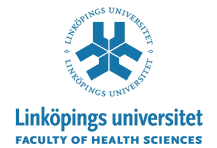|
|
| |
| COURSE TITLE |
| Advanced Immunology,
7,5 points |
| |
COURSE CATEGORY Programkurs/Fristående kurs
MAIN FIELD OF STUDY Medicinsk biologi
SUBJECT AREA
|
|
COURSE CODE |
|
OMBIMM |
|
| AIM OF THE COURSE |
| The aim of the course is for the students to provide an advanced understanding in immunology. Particular emphasis will be taken on molecular and cellular aspects of immunophysiology and pathophysiology. The purpose of the course is also to facilitate the understanding of mechanisms involved in the regulation and the functions of the immune system. Furhtermore, the course will give an overview on ongoing research within the field of immunology. |
| CONTENTS |
* General immunobiology
* Immunogenetics
* Immunopathology
* Regulation of the immune system and homeostasis
* Immunological diseases: autoimmunity, inflammation and immunodeficiency
* Immunotherapy |
| TEACHING |
The course consists of two parts: the first one focus on work in tutorial groups and lectures. The latter part of the course includes literature studies and seminars.
The educational method used is problem-based learning (PBL). PBL emphasises the student´s development of free, self-supporting, lifelong learning ability as an instrument for critical inquiry. The students own queries and formulated problems form the basis of PBL. Important is also the student´s ability to take responsibility for his/her own learning, and to seek and evaluate information and knowledge and to train co-operation and flexible attitude to different views and ideas. |
| EXAMINATION |
Written reports, seminars and written examination.
Students, which have not passed on the regular examination occasion, are normally offered four additional opportunities according to this syllabus, one of which is close in time to the first examination occasion. Students who have failed three times on the course or part of the course are entitled to request another examiner at the new examination occasion. |
| ADMISSION REQUIREMENTS |
| Bachelor of Science in Biomedicine or other related subjects such as Medicine or Biology. At least three years of full-time undergraduate studies in a relevant main subject. For students in the Medical Biology Programme, 160 credits: Passed semester 1 to 5. |
| GRADING |
|
| CERTIFICATE |
| |
| COURSE LITERATURE |
| The course literature is decided upon by the department
in question. |
| OTHER INFORMATION |
|
| |
Advanced Immunology
Advanced Immunology |
| |
Department responsible
for
the course or
equivalent:
MEDBIO - Medicinsk biologi |
| |
|
|
|
|
|
| Registrar No: LiU 221/02-41 |
|
Course Code: OMBIMM |
|
|
|
| |
|
Exam codes: see Local Computer System |
|
|
|
| Subject/Subject Area : Medicinsk biologi |
|
|
|
|
|
| |
|
|
|
|
|
| Level |
|
Education level |
|
|
Subject Area Code |
|
Field of Education |
|
| D |
|
|
|
|
|
|
Medicin |
|
|
2002-11-25
|
|
|
| |
